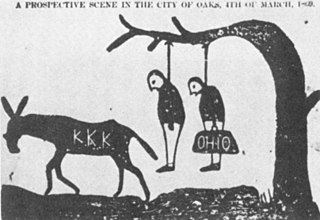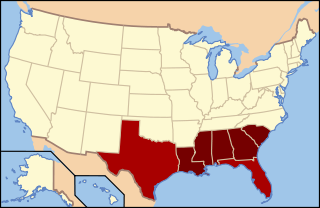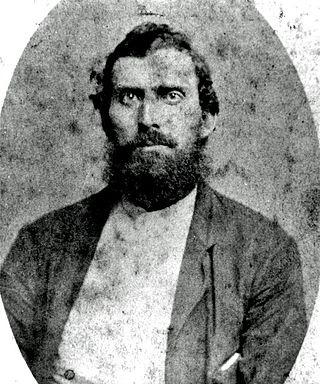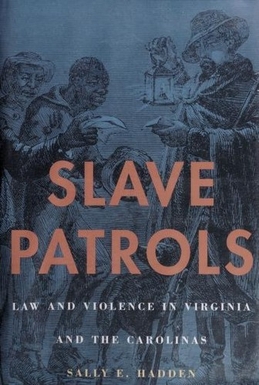Related Research Articles

The American Civil War was a civil war in the United States between the Union and the Confederacy, which had been formed by states that had seceded from the Union. The cause of the war was the dispute over whether slavery would be permitted to expand into the western territories, leading to more slave states, or be prevented from doing so, which many believed would place slavery on a course of ultimate extinction.

The Emancipation Proclamation, officially Proclamation 95, was a presidential proclamation and executive order issued by United States President Abraham Lincoln on January 1, 1863, during the American Civil War. The Proclamation had the effect of changing the legal status of more than 3.5 million enslaved African Americans in the secessionist Confederate states from enslaved to free. As soon as slaves escaped the control of their enslavers, either by fleeing to Union lines or through the advance of federal troops, they were permanently free. In addition, the Proclamation allowed for former slaves to "be received into the armed service of the United States". The Emancipation Proclamation was a significant part of the end of slavery in the United States.

The Reconstruction era was a period in United States history following the American Civil War, dominated by the legal, social, and political challenges of abolishing slavery and reintegrating the former Confederate States of America into the United States. During this period, three amendments were added to the United States Constitution to grant equal civil rights to the newly freed slaves.
The Radical Republicans were a faction within the Republican Party originating from the party's founding in 1854—some six years before the Civil War—until the Compromise of 1877, which effectively ended Reconstruction. They called themselves "Radicals" because of their goal of immediate, complete, and permanent eradication of slavery in the United States. They were opposed during the war by the Moderate Republicans, and by the Democratic Party. Radicals led efforts after the war to establish civil rights for former slaves and fully implement emancipation. After unsuccessful measures in 1866 resulted in violence against former slaves in the rebel states, Radicals pushed the Fourteenth Amendment for statutory protections through Congress. They opposed allowing ex-Confederate officers to retake political power in the Southern U.S., and emphasized equality, civil rights and voting rights for the "freedmen", i.e., former slaves who had been freed during or after the Civil War by the Emancipation Proclamation and the Thirteenth Amendment.

In United States history, the pejorative scalawag referred to white Southerners who supported Reconstruction policies and efforts after the conclusion of the American Civil War.

The Deep South or the Lower South is a cultural and geographic subregion of the Southern United States. The term was first used to describe the states which were most economically dependent on plantations and slavery. After the American Civil War ended in 1865, the region suffered economic hardship and was a major site of racial tension during and after the Reconstruction era. Before 1945, the Deep South was often referred to as the "Cotton States" since cotton was the primary cash crop for economic production. The civil rights movement in the 1950s and 1960s helped usher in a new era, sometimes referred to as the New South.

Eric Foner is an American historian. He writes extensively on American political history, the history of freedom, the early history of the Republican Party, African American biography, the American Civil War, Reconstruction, and historiography, and has been a member of the faculty at the Columbia University Department of History since 1982. He is the author of several popular textbooks. According to the Open Syllabus Project, Foner is the most frequently cited author on college syllabi for history courses.
William Archibald Dunning was an American historian and political scientist at Columbia University noted for his work on the Reconstruction era of the United States. He founded the informal Dunning School of interpreting the Reconstruction era through his own writings and the Ph.D. dissertations of his numerous students. Dunning has been criticized for advocating white supremacist interpretations, his "blatant use of the discipline of history for reactionary ends" and for offering "scholarly legitimacy to the disenfranchisement of southern blacks and to the Jim Crow system."
The Ironclad Oath was an oath promoted by Radical Republicans that required federal employees, lawyers, and federal elected officials to swear upon entry of office that they had never supported the Confederacy. The first such law adopted by Congress was in 1862 which attempted to make the oath a requirement for the incoming members of the 38th United States Congress to take the oath. In 1863, President Abraham Lincoln proposed the Ten percent plan, which proposed that a state in rebellion could be reintegrated if a similar oath, with an additional pledge to abide by the nationwide abolition of slavery, was taken by 10% of its voters. Congress then attempted to raise this to 51% of voters in the Wade–Davis Bill of 1864, which Lincoln pocket vetoed on the grounds that it was too harsh. After the assassination of Lincoln in 1865, his successor, Andrew Johnson, opposed the oath altogether. Given the temporary disenfranchisement of the numerous Confederate veterans and local civic leaders, a new Republican biracial coalition came to power in the eleven Southern states during Reconstruction. Southern conservative Democrats were angered to have been disenfranchised.
Greg Downs is an author and historian. He is best known for the Flannery O'Connor Award-winning short story collection Spit Baths (2006) and his histories of the United States Civil War.

Disfranchisement after the Reconstruction era in the United States, especially in the Southern United States, was based on a series of laws, new constitutions, and practices in the South that were deliberately used to prevent black citizens from registering to vote and voting. These measures were enacted by the former Confederate states at the turn of the 20th century. Efforts were also made in Maryland, Kentucky, and Oklahoma. Their actions were designed to thwart the objective of the Fifteenth Amendment to the United States Constitution, ratified in 1870, which prohibited states from depriving voters of their voting rights on the basis of race. The laws were frequently written in ways to be ostensibly non-racial on paper, but were implemented in ways that selectively suppressed black voters apart from other voters.
The American Civil War bibliography comprises books that deal in large part with the American Civil War. There are over 60,000 books on the war, with more appearing each month. Authors James Lincoln Collier and Christopher Collier stated in 2012, "No event in American history has been so thoroughly studied, not merely by historians, but by tens of thousands of other Americans who have made the war their hobby. Perhaps a hundred thousand books have been published about the Civil War."

This is a selected bibliography of the main scholarly books and articles of Reconstruction, the period after the American Civil War, 1863–1877.

Brooks Donohue Simpson is an American historian and an ASU Foundation Professor of History at Arizona State University, specializing in American political and military history, especially the American Civil War and Reconstruction eras and the American presidency.

In the United States, Southern Unionists were white Southerners living in the Confederate States of America opposed to secession. Many fought for the Union during the Civil War. These people are also referred to as Southern Loyalists, Union Loyalists, or Lincoln's Loyalists. Pro-Confederates in the South derided them as "Tories". During Reconstruction, these terms were replaced by "scalawag", which covered all Southern whites who supported the Republican Party.
The civil rights movement (1865–1896) aimed to eliminate racial discrimination against African Americans, improve their educational and employment opportunities, and establish their electoral power, just after the abolition of slavery in the United States. The period from 1865 to 1895 saw a tremendous change in the fortunes of the black community following the elimination of slavery in the South.

The lily-white movement was an anti-black political movement within the Republican Party in the United States in the late 19th and early 20th centuries. It was a response to the political and socioeconomic gains made by African-Americans following the Civil War and the Thirteenth Amendment to the Constitution, which eliminated slavery and involuntary servitude "except as punishment for a crime".
In general the bibliography of the American Civil War comprises over 60,000 books on the war, with more appearing each month. There is no complete bibliography to the war; the largest guide to books is over 40 years old and lists over 6,000 titles selected by leading scholars. The largest guides to the historiography annotates over a thousand titles.

The 1956 United States presidential election in Alabama took place on November 6, 1956, as part of the 1956 United States presidential election. Alabama voters chose eleven representatives, or electors, to the Electoral College, who voted for president and vice president. In Alabama, voters voted for electors individually instead of as a slate, as in the other states.

Slave Patrols: Law and Violence in Virginia and the Carolinas is a 2001 non-fiction book published by Harvard University Press by historian Sally E. Hadden. Hadden investigates the origins of slave patrols, that often enforced laws involving slaves, in the late seventeenth century in the American states of Virginia, North Carolina and South Carolina and the role these patrols had on the Ku Klux Klan after the American Civil War, an internal war following the secession of the Confederate States of America, which intended to uphold the enslavement of black people.
References
- ↑ Obituary, Chicago Tribune August 2, 2020
- ↑ "Edelstein on Perman, 'Emancipation and Reconstruction' | H-CivWar | H-Net". networks.h-net.org.
- ↑ Broomall, James J. (2013). "The Southern Political Tradition by Michael Perman". Civil War History. 59 (4): 529–530. doi:10.1353/cwh.2013.0090. S2CID 140862449.